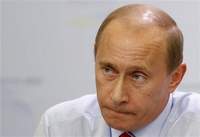Putin's missile proposals catch US administration off guard
Russian President Vladimir Putin sought to counter U.S. plans for a missile defense shield in eastern Europe by suggesting that missile interceptors be deployed in Turkey or even Iraq, closer to potential threats.

In an apparent bid to win Europe's support for his plan first announced a day after his meeting with U.S. President George W. Bush, Putin said Friday that his proposal would make it possible to shoot down missiles far away from Europe and prevent their fragments from falling on European cities.
"Such metal fragments could pierce seven-story apartment buildings, and end up in basements," Putin said at a news conference following a summit of the Group of Eight leading industrialized nations in the Germany Baltic Sea resort of Heiligendamm. "If our proposal is accepted, they will fall into the sea."
Putin also invited the Europeans to join talks on building a prospective missile shield.
"Instead of taking a unilateral or even bilateral action, we are proposing to create a pool of European nations to assess missile threats through 2020 and agree on a joint action to fend off these threats," he said.
Putin's statement came a day after he proposed that Bush drop U.S. plans to deploy missile defense sites in Poland and the Czech Republic and instead create a joint missile defense system with Russia using a powerful existing radar in Azerbaijan.
Bush was noncommittal, and the two leaders said they would leave it to military experts to discuss the initiative before taking it up during talks in Kennebunkport, Maine, in early July.
"In this case, there will be no need to build a radar in the Czech Republic and deploy missile interceptors in Poland," Putin said. "They could be deployed in the south _ I'm speaking hypothetically since it's necessary to conduct talks with relevant nations _ possibly in U.S. NATO allies, such as Turkey."
"Or it could be Iraq _ what they have waged the war for? There would be at least some benefit coming out of it," Putin added on a sarcastic note. He said missile interceptors could be also deployed on the sea platforms of military ships.
U.S. Secretary of State Condoleezza Rice said Putin's Azerbaijan suggestion caught the Bush administration off guard, but said it was worth looking into, even as negotiations with Poland and the Czech Republic continue.
"One does not choose sites for missile defense out of the blue," she told The Associated Press. "It's geometry and geography as to how you intercept a missile."
An Iraqi government spokesman reacted with annoyance to Putin's remarks.
"We have nothing to do with the missile shield project. Nobody asked us about this thing," spokesman Ali al-Dabbagh said in Baghdad.
The proposal - after weeks of threats and rhetoric - made some observers think Putin had been deliberately raising tensions in order to outmaneuver Washington by posing as a peacemaker.
Fyodor Lukyanov, the editor of Russia in Global Affairs magazine, said Putin's proposal was a smart move that would make it harder for Washington to prove the need for basing missile defense in Poland and the Czech Republic.
"From the tactical viewpoint, it's a very good move that turns the table over with all the cards.
"If for some reasons ... they reject it ... then everything that Russia has been saying will sound much more convincing," Lukyanov said.
Putin said if the United States agrees to his plan, Russia won't have to target U.S. and its allies in Europe.
"In that case, there will be no need whatsoever to target any facilities in Europe or the United States with our missiles," Putin said. "Such a need would be totally excluded. And we won't deploy our missile units in (Russia's westernmost) Kaliningrad region or move them closer to Russia's western borders."
He reaffirmed that the currently planned U.S. missile defense sites threatened Russia's nuclear forces and could push the world toward a new conflict.
"If one party has an illusion that it's protected from a retaliatory strike, it becomes more aggressive and that could lead to serious conflicts," he said.
In an apparent attempt to soothe possible Iranian anger over his proposal, Putin said his plan shouldn't worry Tehran since the radar that Russia proposes to share with the U.S. has been operating for a long time. "I don't think that it will lead to worsening of our relations with Iran."
Putin also repeated that Iran doesn't have a long-range missile capability and cited Iranian officials' statements that Tehran had no intention to attack Europe.
As he spoke, a German-Russian opposition activist threw a handful of leaflets into the air and shouted protests in German, briefly disrupting the news conference.
The activist, Konstantin Schuckmann, 20, later told reporters he was acting on behalf the Other Russia opposition umbrella group led by ex-chess champion Garry Kasparov.
"Outstanding. Well done," Putin told him in Russian, adding in German: "Young man, give me what you're throwing."
He then answered Schuckmann by fending off accusations of backsliding on democracy, saying Russia's opposition groups have the right to protest but must obey the law. Authorities in the past have refused to sanction opposition marches, with police forcefully dispersing most and beating participants.
Putin promised that parliamentary elections this year and next year's presidential vote will be democratic, but sternly warned foreign nations against meddling in Russia's affairs.
"We won't allow any attempts to intervene and support some political forces in Russia ahead of big political events," he said.
Subscribe to Pravda.Ru Telegram channel, Facebook, RSS!





